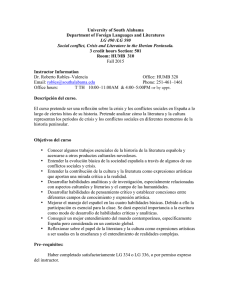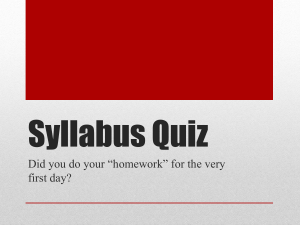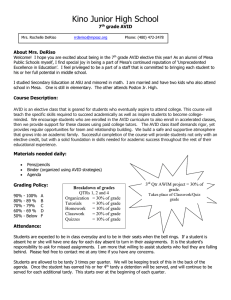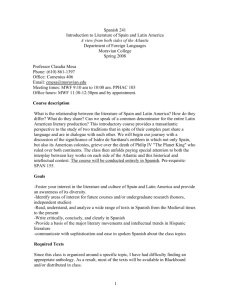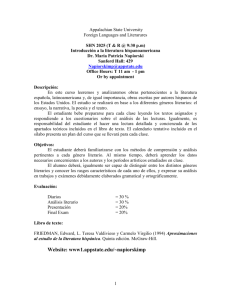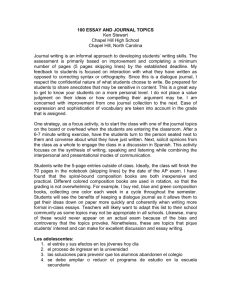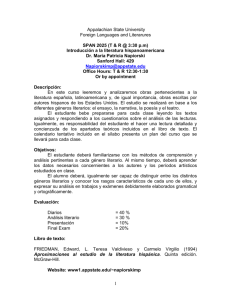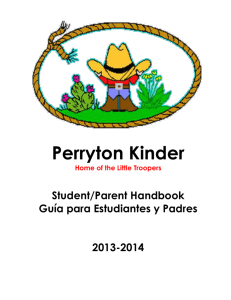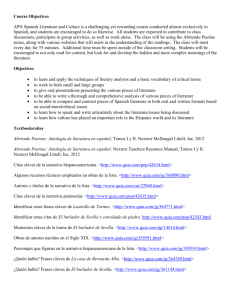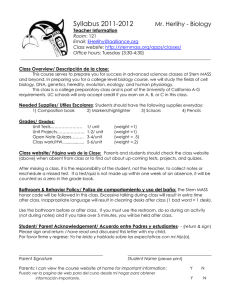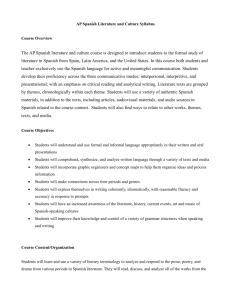class objectives - UF Spanish and Portuguese Syllabi
advertisement
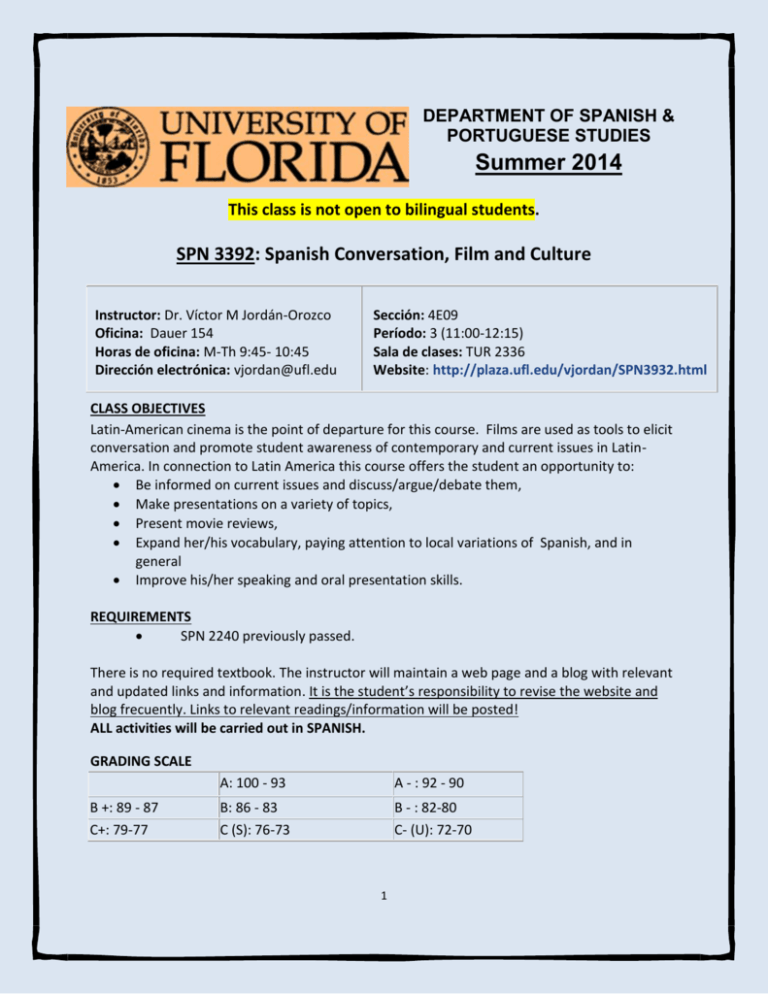
DEPARTMENT OF SPANISH & PORTUGUESE STUDIES Summer 2014 This class is not open to bilingual students. SPN 3392: Spanish Conversation, Film and Culture Instructor: Dr. Víctor M Jordán-Orozco Oficina: Dauer 154 Horas de oficina: M-Th 9:45- 10:45 Dirección electrónica: vjordan@ufl.edu Sección: 4E09 Período: 3 (11:00-12:15) Sala de clases: TUR 2336 Website: http://plaza.ufl.edu/vjordan/SPN3932.html CLASS OBJECTIVES Latin-American cinema is the point of departure for this course. Films are used as tools to elicit conversation and promote student awareness of contemporary and current issues in LatinAmerica. In connection to Latin America this course offers the student an opportunity to: Be informed on current issues and discuss/argue/debate them, Make presentations on a variety of topics, Present movie reviews, Expand her/his vocabulary, paying attention to local variations of Spanish, and in general Improve his/her speaking and oral presentation skills. REQUIREMENTS SPN 2240 previously passed. There is no required textbook. The instructor will maintain a web page and a blog with relevant and updated links and information. It is the student’s responsibility to revise the website and blog frecuently. Links to relevant readings/information will be posted! ALL activities will be carried out in SPANISH. GRADING SCALE B +: 89 - 87 C+: 79-77 A: 100 - 93 A - : 92 - 90 B: 86 - 83 C (S): 76-73 B - : 82-80 C- (U): 72-70 1 CLASS GRADE 10% Informal discussions / Blog / Impromptu participation 15% Movie review: oral presentation on a movie chosen by the student. 15% Oral presentation on a topic related to one of the required movies. 15% Debate / Criticism 15% Q &A / Moderation /Discussion 10 % Final project 20% Short quizzes CALENDAR The calendar will be posted and updated on the website. GENERAL ORGANIZATION The class will be divided into groups or pairs (A-E) which will be assigned different responsibilities in a rotating basis. Although every student is a member of a group, or pair, each student’s work will be assessed individually. INFORMAL DISCUSSION / PARTICIPATION Given that the emphasis of the class is oral communication, the preferred mode of participation is orally (during class), but students can also participate through the blog. All absences will affect this part of the grade. If you are not in class you are, by default, unable to participate/converse. Blog The instructor will maintain a private blog. Students should subscribe to it. This will give the student the possibility to comment on a variety of topics brought up during class discussions, movie reviews and presentations. The blog can also help as a venue to introduce new topics. MOVIE REVIEWS /ORAL PRESENTATIONS Each student is responsible for presenting an oral review of a movie not assigned in class. The student is responsible for letting the instructor know what movie s/he is presenting with at least three days in advance. Once a student reviews a movie the same movie can’t be reviewed by another student. Please see rubric for details on how this is evaluated. Each student is also responsible for a presentation on a topic related to one of the movies assigned as material for the class. Each of the groups in charge of these presentations will meet briefly with the instructor to decide on the topics and make sure that they do not overlap. All presentations will be graded individually. Important: students must: a. Use audio and/or visual material to enhanced and facilitate their presentations. Note cards can be used but reading will result in a failing grade. 2 b. Provide the instructor, before the day of the presentation, with a copy of any material s/he is going to use during the presentation: outline, flashcards, power point, etc. c. Be aware of the time constraints: presentations/movie reviews must be 8-9 minutes long. DEBATES / CRITICISM Topics for debates will come out of the movies that are assigned for the class. Every student should be prepared to support and or oppose a given proposition. The debate will follow a rigid time schema in which the debater will have a specific amount of time to present her/his position and then respond to opposing arguments. An alternative to defending or attacking a given proposition will be the critical analysis of one or more issues/ideas presented in a movie watched in class. Possible topics and/or propositions will be decided by the student(s) and the instructor at the appropriate time. All students must be ready to ask questions and be prepared to present their own points of view. MODERATION / Q&A / PANEL DISCUSSION After watching movies, and listening to reviews and presentations, time will be allotted to conversation. During these discussions the responsibility of the group in charge will be to maintain the discussion active and flowing. Members of each group will be assigned to: ask questions, lead small group discussions and report conclusions to the entire class. More detailed instructions will be given at the appropriate times. QUIZZES The student should assume that there is going to be a quiz everyday on a topic previously discussed in class or posted on the website. Quizzes may include vocabulary, historical or cultural context assigned as homework or discussed in class, readings, movie content and/or themes reviewed, discussed or presented in class. Quizzes take place at the beginning of class, arriving late will result on a missed quiz for which there is no make-up. Length of quizzes will vary between 5 and 15 minutes. Quizzes on films not watched in class will be worth more points. FINAL PROJECT Students are responsible for producing a five minute video, which will be shown to the class at the end of the course. The purpose of the video is to explore yet another way of communicating in Spanish. The topic of the video must be related to a movie that was reviewed or viewed in class. A script should be handed in to the instructor one week before its due day. (Further details TBA). ATTENDANCE and MAKE-UPS Requirements for class attendance and make-up exams, assignments, and other work in this course are consistent with university policies that can be found in the online catalog at: https://catalog.ufl.edu/ugrad/current/regulations/info/attendance.aspx. 3 ATTENDANCE & PREPAREDNESS Attendance to class is of extreme importance. All grades in one way or other are based on oral interaction and communication, attendance is therefore essential. In case of a medical emergency the student must provide the proper documentation. Given the structure of the course it is essential that students come to class prepared to participate in Spanish on the assigned /planned topics /activities. ACADEMIC INTEGRITY All students are required to abide by the Academic Honesty Guidelines of the University. The UF Honor Code reads: “We, the members of the University of Florida community, pledge to hold ourselves and our peers to the highest standards of honesty and integrity.” On all work submitted for credit by students at the University of Florida, the following pledge is either required or implied: “On my honor, I have neither given nor received unauthorized aid in doing this assignment.” For more information please refer to http://www.dso.ufl.edu/studentguide. COUNSELING AND WELLNESS A variety of counseling, mental health and psychiatric services are available through the UF Counseling and Wellness Center, whose goal is to help students be maximally effective in their academic pursuits by reducing or eliminating emotional, psychological, and interpersonal problems that interfere with academic functioning. The Center can be found online at http://www.counseling.ufl.edu/cwc or reached by phone at 392-1575. CLASSROOM ACCOMODATIONS Students requesting classroom accommodation must first register with the Dean of Students Office, https://www.dso.ufl.edu/. This office will provide documentation to the student who must then provide this documentation to the instructor when requesting the classroom accommodation. COURSE EVALUATIONS Students are expected to provide feedback on the quality of instruction in this course based on 10 criteria. These evaluations are conducted online at https://evaluations.ufl.edu. Evaluations are typically open during the last two or three weeks of the semester, but students will be given specific times when they are open. Summary results of these assessments are available to students at https://evaluations.ufl.edu/results. IMPORTANT NOTICE Students requesting classroom accommodation must first register with the Dean of Students Office. The Dean of Students Office will provide documentation to the student who must then provide this documentation to the instructor when requesting accommodation. 4 Rúbrica para la evaluación de las reseñas Película: Nombre: ¿Qué se evalúa? Organización/planeación: El instructor recibe el plan de la reseña con anticipación. El plan muestra una buena organización previa que se refleja en la presentación. Exposición: Hay fluidez. No hay lectura. No hay repeticiones. Hay buen uso de elementos audiovisuales. Dicción: fuerte y clara. Buena pronunciación y entonación. Vocabulario variado y preciso. Resumen: concreto, relevante y claro. [No se cuenta la historia. Se hace referencia a escenas o momentos importantes]. No spoilers Enfoque: se concentra en lo más importante: personajes, temática, etc. No se dan detalles en exceso. No hay repetición. Tema(s): se explican de manera concreta y efectiva. Hay investigación cuando el tema lo requiere. Datos generales: se mencionaron el país, fecha, director, actores y otra información de relevancia. Hay referencias al director, a los actores, a otras películas, a la técnica de la filmación y/o a cualquier otro material que enriquece la reseña. El presentador usa la lista de vocabulario del website. Comentarios críticos (1) Se mencionan los aspectos positivos/ fortalezas y negativos/debilidades de la película. Hay sustentación. Comentarios críticos (2) Hay una recomendación general apoyada por una opinión personal sustentada. 10-9 8-7 6-5 4-0 NOTA ______/100 Comentarios: 5 Rúbrica para la evaluación del debate / análisis crítico #____ Proposición / posición crítica: Nombre: Investigación: se presentan referencias directas o indirectas de distintas fuentes de información. Se utilizan fuentes confiables. Se demuestra conocimiento del tema. Claridad de expresión: la vocalización, pronunciación y enunciación son claras. Hay fluidez. No hay lectura de apuntes/anotaciones. Claridad de ideas: los argumentos y/o contra argumentos presentados son concretos y claros. Hay sustentación de ideas sin repeticiones o información irrelevante. Organización: Hay una organización evidente. El orden en la presentación de ideas y la contra argumentación es claro y preciso Tiempo: hay un uso apropiado de tiempo. No hay apuro ni demora en la presentación de las ideas. Respuestas a las preguntas de la clase (improvisación): hay concreción, claridad y solidez. Se demuestra conocimiento del tema. TOTAL Comentarios: 6 10 - 9 8-7 6 -5 4 -1 10 - 9 8-7 6 -5 4 -1 10 - 9 8-7 6 -5 4 -1 10 - 9 8-7 6 -5 4 -1 10 - 9 8-7 6 -5 4 -1 10 - 9 8-7 6 -5 4 -1 Rúbrica para las presentaciones orales y el trabajo final Nombre ______________________________ Tema_________________________ La dicción: claridad y pronunciación La exposición es claramente comprensible. El significado de términos e ideas es preciso. Los errores de gramática y dicción no impiden entender las ideas presentadas. En ocasiones algunos errores le restan claridad a la exposición. La exposición es difícil de entender en repetidas ocasiones. Las ideas no están claramente expuestas. El contenido: ideas y contextos La presentación de ideas, conceptos y contextos es original y está bien sustentada. Hay buena aplicación de las fuentes investigadas. Se plantean preguntas interesantes que promueven la conversación. La presentación carece de algunos detalles o aspectos importantes. Es aceptable pero de aportes limitados. Hay repetición. Faltan aspectos importantes en la presentación. Hay poca originalidad en las ideas. No se utiliza el tiempo disponible de manera eficiente y efectiva. La organización Hay consulta previa y a tiempo con el instructor y evidencia (resumen, bosquejo) de la presentación. La presentación está bien organizada y planeada, con objetivos claros. La organización es aparente pero en ocasiones hay vaguedad / inexactitud en el propósito y los objetivos. El resumen y/o bosquejo están incompletos. No hay evidencia de planeación. La presentación El expositor no lee ni memoriza la presentación. El uso de anotaciones es el adecuado. La comunicación es natural y efectiva. El expositor no lee pero tiene dificultades ocasionales. En su mayoría la presentación es efectiva. Hay apartes memorizados. El expositor lee en ocasiones y/o depende mucho de sus anotaciones. Hay poca evidencia de una adecuada capacidad de comunicación. NOTA 30 29 28 26 24 22 20 18 16 30 29 28 26 24 22 20 18 16 20 19 18 16 14 12 10 8 6 20 19 18 16 14 12 10 8 6 ______ / 100 Comentarios: 7
